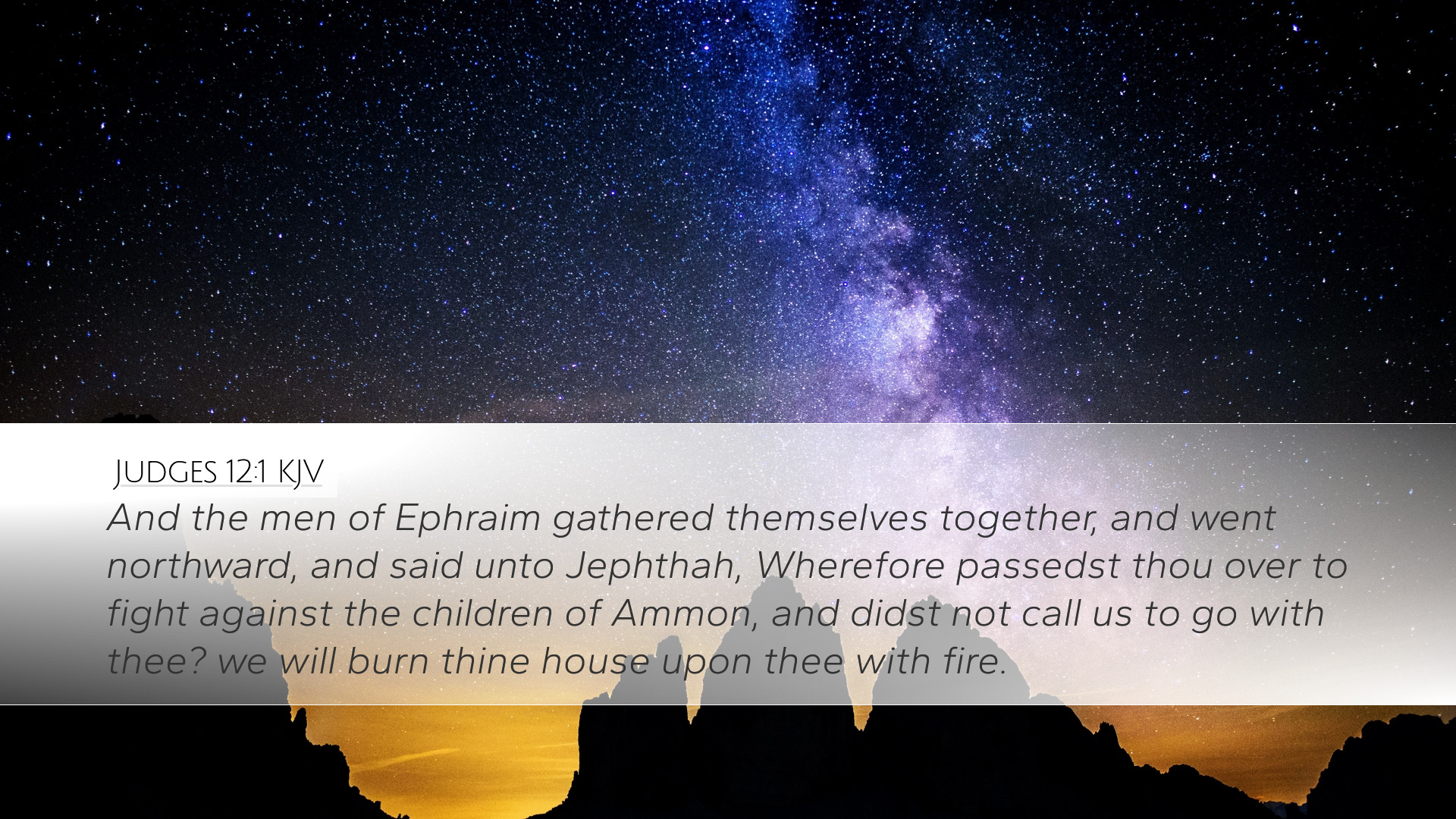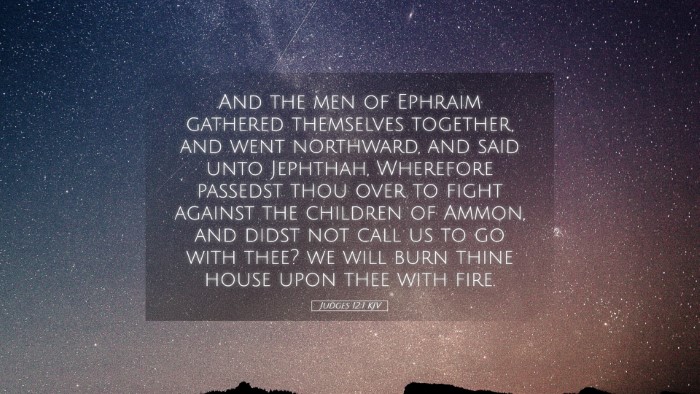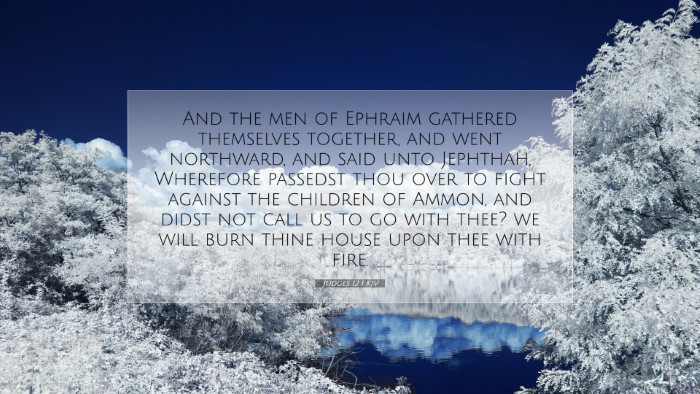Old Testament
Genesis Exodus Leviticus Numbers Deuteronomy Joshua Judges Ruth 1 Samuel 2 Samuel 1 Kings 2 Kings 1 Chronicles 2 Chronicles Ezra Nehemiah Esther Job Psalms Proverbs Ecclesiastes Song of Solomon Isaiah Jeremiah Lamentations Ezekiel Daniel Hosea Joel Amos Obadiah Jonah Micah Nahum Habakkuk Zephaniah Haggai Zechariah MalachiJudges 12:1
Judges 12:1 KJV
And the men of Ephraim gathered themselves together, and went northward, and said unto Jephthah, Wherefore passedst thou over to fight against the children of Ammon, and didst not call us to go with thee? we will burn thine house upon thee with fire.
Judges 12:1 Bible Commentary
Commentary on Judges 12:1
Judges 12:1 states:
"And the men of Ephraim gathered themselves together, and went northward, and said unto Jephthah, Wherefore passedest thou over to fight against the children of Ammon, and didst not call us to go with thee? We will burn thine house upon thee with fire."
Introduction
This verse presents a dramatic conflict that reflects the territorial and tribal tensions prevalent in Israel during the time of the Judges. The men of Ephraim confront Jephthah, who has led the Israelites to victory over the Ammonites, questioning his motives and intentions. This encounter not only highlights Ephraim's pride and arrogance but also serves as a lesson on unity and leadership within the body of Israel.
Historical Context
To fully appreciate Judges 12:1, it is crucial to understand the historical context of this period. The book of Judges illustrates a time of spiritual decline and moral ambiguity for Israel, marked by cycles of sin, oppression, crying out to God, and deliverance. Jephthah, an unlikely hero, was called to lead during a time of dire need as the Ammonites oppressed Israel. His victory signifies divine intervention amidst human rebellion.
The Role of Ephraim
As one of the most prominent tribes of Israel, Ephraim often held a position of power and esteem. Their aggressive approach in questioning Jephthah stems from a sense of entitlement, as they felt overlooked and neglected in the battle against the Ammonites.
The Confrontation with Jephthah
The anger of Ephraim, as expressed in this verse, is representative of a larger issue of tribal jealousies and strife. Matthew Henry emphasizes that Ephraim's response reveals a lack of humility and an inflated sense of self-importance. They demanded not only acknowledgment of their absence in Jephthah’s military call but also punishment—threatening to destroy Jephthah and his household.
Motivations Behind the Confrontation
Albert Barnes notes that their grievance was not simply about military participation but rather about pride and perception. The men of Ephraim sought recognition for their past contributions and felt insulted by being left out. Their actions unveil the human tendency to prioritize stature and reputation over collective achievement and divine calling.
Implications for Leadership
This confrontation serves as a vivid reminder for leaders today about the challenges posed by jealousy and rivalry within congregations or organizations. Jephthah, in this scenario, is forced to navigate a volatile situation that could have implications far beyond mere verbal conflict.
Jephthah's Response
In response to Ephraim’s accusations, Jephthah takes a measured approach. Rather than retaliate in anger, he seeks to elucidate the circumstances of the battle. His dialogue exemplifies the qualities of a wise leader—one who addresses grievances without falling into the trap of personal vendettas or emotional reactions.
Examination of Jephthah's Leadership Qualities
- Patience: Jephthah refuses to respond to the hostility with hostility. His composed demeanor stands in stark contrast to Ephraim's abruptness.
- Clarity: He clarifies the reasons for his actions, emphasizing the necessity of fighting against a common enemy.
- Focus on Unity: Jephthah's appeal, though initially rebuffed, is framed within the context of shared deliverance and divine aid.
Theological Reflections
From a theological perspective, the strife between the tribes exemplifies the broader theme of Israel's unity under God. The question posed by Ephraim, "Wherefore passedest thou over," can serve as a metaphor for the Church today— how often do we observe divisions and misunderstandings arising within our ranks?
Unity in the Body of Christ
Much like Israel, the Church is called to unity, yet strife often arises from misunderstandings and pride. Paul’s teachings in the New Testament about the body of Christ emphasize the importance of each member working together harmoniously towards the greater good. The disunity seen in Judges serves as a cautionary tale for contemporary believers against conflicts fueled by pride, lack of communication, and perceived exclusion.
Conclusion
Judges 12:1 serves as a poignant reminder of the human condition and the complexities of leadership and community dynamics. Jephthah’s narrative, intertwined with Ephraim's indignation, underscores themes of humility, recognition, and the necessity for cohesive action in the face of opposition.
Pastors, students, and theologians may find in this passage an invitation to not only reflect on historical Israel's challenges but also to seek God's guidance in nurturing unity within their own congregations and communities. By embodying the qualities that Jephthah displayed—patience, clarity, and a focus on collective purpose—believers can overcome division and echo the call to serve the Lord in unity and love.


